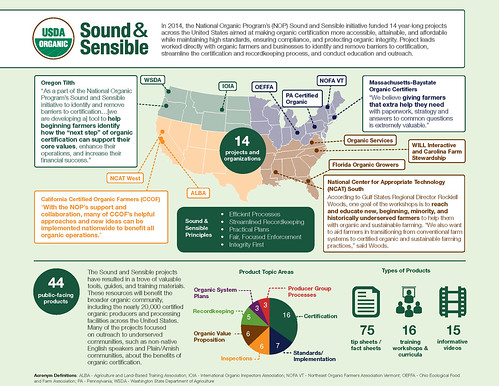
USDA’s National Organic Program is the bedrock regulatory program responsible for developing national standards for organically-produced agricultural products. These standards assure consumers that products with the USDA organic seal meet consistent, uniform standards. In addition to protecting the integrity of the organic seal through a rigorous certification process and oversight, we are committed to connecting organic farmers and businesses with USDA resources, including conservation assistance, access to loans and grants, funding for organic research and education, and mitigation of pest emergencies.
The USDA organic seal and the NOP program itself have helped organic producers and businesses achieve unprecedented levels of growth for organically produced goods. The retail market for organic products has nearly doubled in value since 2009 while USDA certified organic operations continue to grow year to year. USDA’s National Organic Program is a leading global standard and major factor in this success.
Last year, the USDA Agricultural Marketing Service’s National Organic Program (NOP) made awards to 14 organizations to support the Sound and Sensible Initiative. Since then, these groups have worked with hundreds of farmers and livestock handlers nationwide to help them simplify and streamline organic certification and compliance. Now, USDA is ready to share the results of these projects, including an array of valuable tools and resources – templates, decision-making tools, trainings, guides, tip sheets, and videos – with the entire organic community, from certifying agents to certified organic operations, to producers who are considering organic certification for the first time.
All of the projects share a common goal – making organic certification more accessible, attainable, and affordable while maintaining high standards, ensuring compliance, and protecting organic integrity. These projects educate producers and provide them with tools and information resources needed to streamline certification, inspections, recordkeeping, and compliance.
Over the past year, the awarded organizations have helped more than 2,000 U.S. farmers, handlers, and producers by:
- Conducting training workshops with hundreds of farmers on certification, transitioning to organic, inspections, recordkeeping, and standards compliance.
- Interviewing dozens of farmers to hear first-hand certification experiences and share challenges, benefits, and lessons learned through training and outreach videos.
- Engaging more than 50 farmers in peer partnership programs, including “farm walks” led by certified organic farmers to share best practices and a mentorship program that partnered newly certified producers with more experienced operations.
- Conducting outreach to more than 1,600 producers in typically under-served populations, including Plain/Amish communities, non-English-speaking communities, direct-market farmers, and producer groups.
- Developing cost-benefit analysis and readiness assessment tools, templates for organic system plans and recordkeeping practices, and guides and tip sheets that address high-interest topics.
Over the next several months, these projects will have an even greater impact on the organic community, as the NOP will release more than 40 tools and resources resulting from the Sound and Sensible Initiative, including:
- 75 tip sheets or factsheets on the certification process and standards compliance
- 16 training presentations on a wide range of certification topics
- 15 informative videos on topics including inspection processes and the value of organic certification
- Templates for certifiers, USDA field offices and other organizations to develop their own outreach programs, training workshops, and peer-to-peer programs for producers
We will release the products in several phases, grouped by theme and audience. With these valuable tools and resources, farmers and producers will be better able to understand the benefits of organic certification and decide whether organic certification is right for them.
Through the National Organic Program, USDA has helped organic farmers and businesses achieve $39 billion annually in U.S. retail sales. USDA’s commitment to supporting organic agriculture has been critical to the sector’s continued growth. In addition to protecting the integrity of the organic seal through a rigorous certification process and oversight, we are committed to connecting organic farmers and businesses with USDA resources, including conservation assistance, access to loans and grants, funding for organic research and education, and mitigation of pest emergencies.



